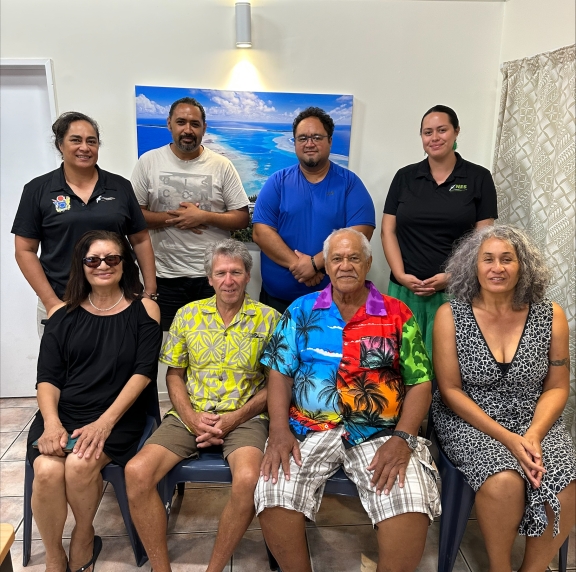Dedicated towards conserving Cook Islands biodiversity, the island nation is applying for the Takitumu Conservation Area to be recognised as an ‘Other Effective area-based Conservation Measure’.
If successful, this will be the first internationally acknowledged OECM in the Pacific Islands region. OECMs are not formally Protected Areas but are geographically defined areas that are governed and managed in ways that sustain positive and long-term conservation outcomes. Their purpose is to achieve long term and effective in-situ conservation of biodiversity outside of protected areas.
The Takitumu Conservation Area (TCA) is 155 hectares of conserved land on the island of Rarotonga, collectively owned by three traditional landowning families. It was informally protected by these three families in 1996 primarily to protect the endemic kākerōri / Rarotonga flycatcher (Pomarea dimidiata), one of the most threatened birds in the world. Their commitment to establish the TCA as an OECM will help in achieving 25 percent protection of land in line with the Cook Islands National Sustainable Development Agenda 2020+.
This progress from the Cook Islands comes just over a year after a two-day workshop was hosted in Rarotonga bringing a wide range of stakeholders together to learn more about OECMs, their benefits, and how this can be achieved.
“We’re excited and pleased by the potential of the TCA becoming an Other Effective area-based Conservation Measure. We, as Cook Islanders fully understand the value of our biodiversity to our culture, our heritage and our people,” said Jessie Nicholson, Biodiversity Coordinator of the Cook Islands National Environment Service.
“Since the initial workshop was hosted in the Cook Islands in January 2023, we, alongside the landowners and community have been working towards making this happen. This is a true demonstration of just how much we are committed towards protecting and conserving our biodiversity.”
This target is in line with global obligations as agreed in the post-2020 Global Biodiversity Framework (GBF) to both halt and reverse biodiversity loss.
Endorsed in December 2022, the GBF has 23 targets under four overarching goals to be met by over 195 countries including the Cook Islands. Target three focusses on committing 30 per cent of areas of particular importance to be protected and effectively conserved and managed by 2030. The Cook Islands also supported the High Ambition Coalition for Nature and People which called for 30 per cent of protected areas on land and sea to conserve nature.
There are two primary differences between OECMs and Protected Areas. Unlike Protected Areas, OECMs are not legislated, and biodiversity conservation and protection may not always be their primary objective, however, they deliver benefits for biodiversity conservation regardless.
“Since we have had the initial workshop introducing OECMs to us, we have held a community workshop in 2023 with the TCA landowners, resulting in a working group being established to complete the OECM application form. Once our working group has completed the form and the necessary research, we’ll then take that back to seek final approval from the families that make up the landowners of the Takitumu Conservation Area,” said Nicholson.
“It is our goal to submit this application and have the Takitumu Conservation Area officially awarded as an internationally recognised Other Effective area-based Conservation Measure before the end of 2024.”
The initial Cook Islands Workshop for the Cook Islands on ‘Other Effective Area-based Conservation Measures’ (OECM) held in January 2023 which had led to this progress was supported by the EU-OACPS BIOPAMA programme and its partners – IUCN Oceania, Secretariat of the Pacific Regional Environment Programme (SPREP) and the UN Environment Programme – World Conservation Monitoring Centre (UNEP-WCMC) in partnership with the Cook Islands National Environment Service.
Additional assistance for the workshop, and the progress achieved since then, is provided by the ACPMEAs 3 project. The ACP MEAs programme is a joint partnership between the European Union, the Organisation of African, Caribbean and Pacific States (OACPS), UN Environment Programme (UNEP) and the Food and Agriculture Organisation of the United Nations (FAO). The programme aims to build capacity in 79 countries in Africa, Caribbean and the Pacific (ACP) to support them in fulfilling their obligations as parties to Multilateral Environmental Agreements (MEAs), to address the environmental challenges they face and to reap the benefits of improved environmental governance at national and regional levels.
SPREP is implementing the ACPMEAs 3 Project in partnership with Members for our Pacific Islands region.
“We congratulate the Cook Islands for their swift action since we had our initial discussions of OECMs just over a year ago. We look forward to the Takitumu Conservation Area in Rarotonga being successful in their application and we stand in partnership with the Cook Islands, providing support and assistance to help make this happen,” said Vainuupo Jungblut, Environmental Monitoring and Reporting Adviser of SPREP.
The OECM working group held its second meeting for 2024 to complete their application on 1 February 2024 facilitated by the Cook Islands National Environment Service.
SOURCE: SPREP


















